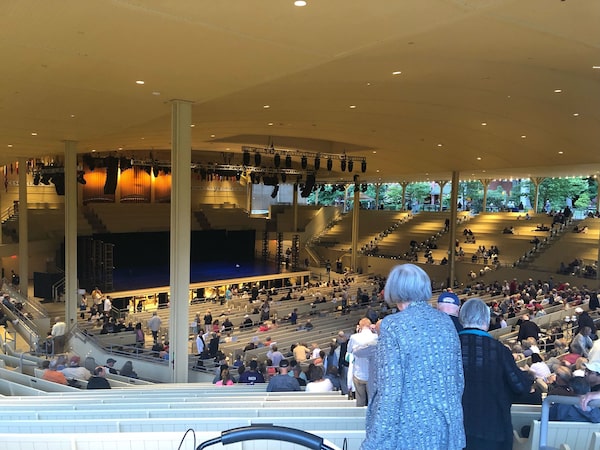
An amphitheatre at the Chautauqua Institution, where Salman Rushdie was attacked on Aug. 12, 2022.BRENDAN BANNON/The New York Times News Service
Catherine Pead and her husband have been coming to Chautauqua each summer for the past two decades. What brings the Hamilton couple to the small lakeside community in upstate New York every year is the Chautauqua Institution: a tranquil, gated retreat where writers, artists, politicians and thought leaders come together to discuss religious, social and political issues.
“When you hear about so much division in the U.S., you come to Chautauqua and you feel like, this is what America could be,” said Ms. Pead, who is a semi-retired community organizer and care worker.
But peace at the institution, located about 90 kilometres southwest of Buffalo, was shattered Friday. Salman Rushdie, an Indian-born, British-American author whose work has enraged the Iranian government for nearly four decades, was stabbed multiple times while taking the stage for a discussion on the United States as an asylum for writers and other artists in exile, and as a home for freedom of creative expression.
The 75-year-old author of The Satanic Verses – a novel that was viewed by many Muslims as blasphemous and led then-Iranian leader Ayatollah Khomeini to issue a fatwa calling for the deaths of Mr. Rushdie and his publishers in 1989 – suffered a damaged liver and severed nerves in an arm and an eye in the attack.
On Sunday, his agent, Andrew Wylie, said Mr. Rushdie was on the road to recovery, and though his injuries were severe, “his usual feisty and defiant sense of humour remains intact.”
Attack on Salman Rushdie prompts reaction from writers, free speech advocates
Opinion: Attack on Salman Rushdie leaves authors at B.C. writing festival horrified

Inside the Chautauqua Institution, in the main square, in New York on Aug. 13, 2022.Jake Kivanc/The Globe and Mail
At the Chautauqua compound, described by many people who have attended its programming as a day camp for adults, life started returning to normal. The entrance was once again inundated with cars and people, all attempting to secure access to the grounds or acquire parking, but only season and weekly pass holders were allowed in. Day passes were no longer issued after the stabbing.
Ms. Pead said she and her husband keep returning to Chautauqua because of its close association with faith and culture.
“There’s the spiritual stuff, there’s the cultural stuff, there’s music, there’s drama, there’s opera, there’s ballet, it’s got so much great stuff,” she said. “All the denominational churches … have houses on campus and it is available for people to come in.”
Paul Evans, a season pass holder who travelled from California to attend the institution’s nine-week summer program, said it was natural curiosity and the desire to do something unique that has kept him and his wife coming to Chautauqua for the last 12 years.
“There’s just no shortage of luminaries, reporters and politicians and authors and experts in the field – in whatever the field is, and each week is a different topic. So it’s just exciting as heck because you never know when you come here. I never heard of a person, and you end up walking away in awe.”

Audience members fill in the amphitheatre at the Chautauqua Institution on Aug. 13, 2022, for a performance by the Washington Ballet and Chautauqua Symphony Orchestra.Jake Kivanc/The Globe and Mail
The institution’s 2,000-acre campus features a range of buildings used for educational and entertainment purposes. The most devoted of Chautauqua followers pay for a season pass, which costs nearly US$3,000.
Some of the people who witnessed the stabbing noted a lack of security measures at the venue for Mr. Rushdie. They said there were no metal detectors or pat downs prior to attending an event with a speaker who had an international bounty on his head.
”The attacker might have perceived this as a soft spot because it’s not public,” said Mr. Evans, who was in the audience when Mr. Rushdie was attacked.
”I’m sure there’ll be a lot of the administration talking about coulda, woulda, shoulda, so that’s not for us to say, but I don’t want to just come back next year and find out we’ve got metal detectors.”
On Saturday night, the institution’s president Michael Hill opened a performance by the Washington Ballet and Chautauqua Symphony Orchestra on the same stage where Mr. Rushdie had been attacked just a day earlier, with a moment of prayer.
“Sometimes we’re processing emotions so complex and so difficult that we don’t yet have a way to process,” Mr. Hill said to a crowd of hundreds who gave him a standing ovation.
“May the majesty of the dancers and the soaring music of the orchestra reclaim and bless this sacred gathering space.”
Our Morning Update and Evening Update newsletters are written by Globe editors, giving you a concise summary of the day’s most important headlines. Sign up today.